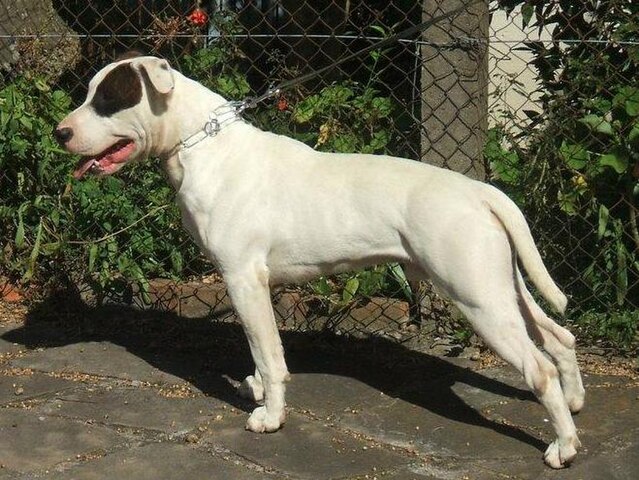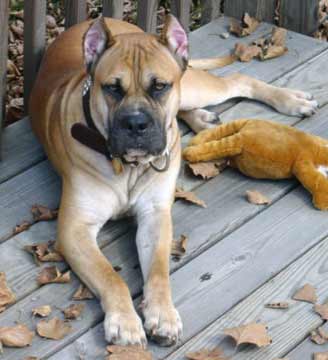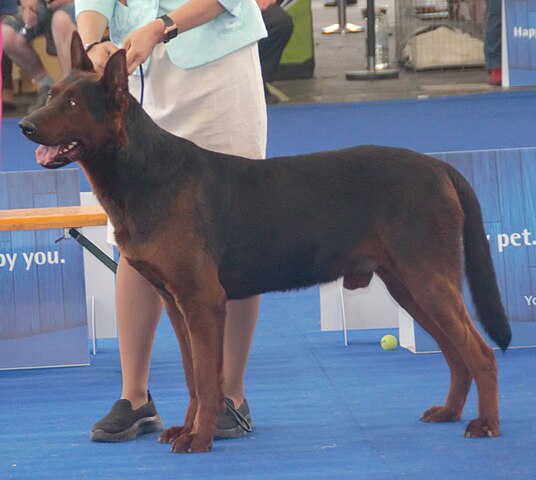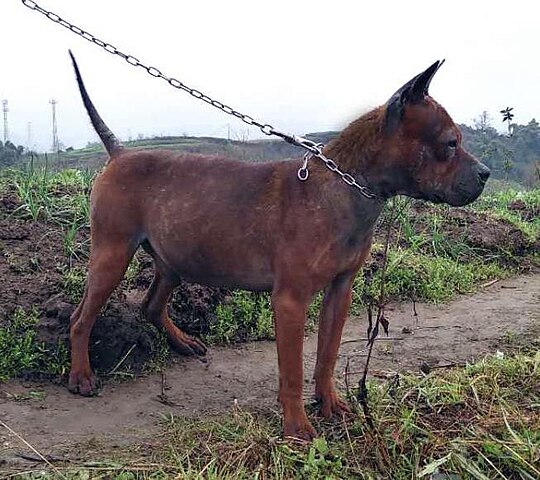The Dogue Brasileiro, also known as the Brazilian Bull Boxer, was created in Brazil by a man named Pedro Dantas. Pedro was a longtime breeder of the Bull Terrier but felt they were becoming “too decorative” and were losing their working abilities. In the late 1970’s a neighbor requested that he breed one of his dogs to their Boxer, and he was so enamored with the results that he began his own breeding program. Mixing the Bull Terrier with the Boxer (hence the name) he began to create a loyal guard dog with the qualities he was looking for. In 1986 he formed a parent club for the breed. Not interested in seeking FCI recognition, Pedro felt that this would only dilute the working qualities of the Dogue Brasileiro, however this molosser breed is recognized locally by the Brazilian Confederation of Cynophilia. They are still quite rare in most of the world.
Dogue Brasileiro are highly trainable and obedient, especially in bite sports and similar guard dog duties. This said they are also gentle, very affectionate, and tolerant towards their owners – showing no aggression or resource guarding when raised correctly. It has always been important that they be balanced temperamentally as this was a primary consideration in the development of the breed. It has been instrumental that excel in two areas – being loyal and affectionate family companions while also being fearless, alert guards. If danger were to appear, they should not hesitate to attack. Today, there are a number of temperament tests made strictly for the breed that all grade various aspects of temperament and drive – the purpose of which is to continue to breed dogs that fit into a particular set of working abilities and disposition. Without passing these tests, a dog cannot become a champion in Brazil.
Dogue Brasileiro are active dogs and far more athletic than their Bull Terrier ancestors. They are also stronger and more agile, have less health problems, and generally have better lifespans (living about 13-14 years on average). They need regular exercise to keep them physically in shape, however exercising with their owners also helps them emotionally as well since they are extremely social animals! They aren’t necessarily playful but do enjoy spending quality time with those whom they love. As they have a lot of energy to expend, a short walk will not be enough. Prospective owners should prepare to spend many hours taking long hikes with their loyal companions. A great activity to provide quality time between owner and dog! 
The Dogue Brasileiro is a muscular, medium sized dog with a short smooth coat although some individuals have slightly longer (medium-length) hair. Grooming needs are very minimal and this breed hardly sheds at all, although it should be noted that they are not hypoallergenic. Any color, variation or combination of colors is acceptable in the coat. Traditionally the ears are cropped short. The muzzle should not have heavily drooping dewlaps, which means they aren’t prone to drooling.
The Dogue Brasileiro is normally a quiet house companion and only barks when there’s a reason to – such as when someone comes to the door. Like most guard dogs, he is territorial and will bark to let a stranger know that they’ve encroached upon his property! Strangers will be treated with suspicion at first, but as long as the person is deemed “ok” they will likely be accepted with friendliness. When it comes to other animals, this breed is likely to get along with other dogs if socialized to them. Pedro noted that his breed wasn’t as combative with canine housemates as compared to his Bull Terriers. However other pets such as cats might not be safe. Children are usually well-regarded by this breed however, and although supervision is always recommended the breed generally does very well even with the very young.
Dogue Brasileiro aren’t the best fit for small apartments due to their high energy levels. Though they can adapt to many situations, they require so much exercise it can be difficult to provide this in an apartment-type setting. It is recommended that owners have a yard with a secure fence in place, as they can be prone to wandering. Also, they do best with owners who aren’t gone for long stretches of time on a regular basis. Being so highly social, they can easily develop separation anxiety otherwise. Finally this breed is generally not recommended for first-time dog owners, mainly because of their higher-than-average guarding instincts. Just because they are wonderful companions does not make them automatically easy for the novice person.



